|
|
|
Sort Order |
|
|
|
Items / Page
|
|
|
|
|
|
|
| Srl | Item |
| 1 |
ID:
105551
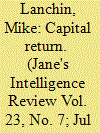

|
|
|
| 2 |
ID:
129433
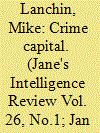

|
|
|
| 3 |
ID:
090173
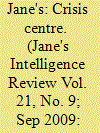

|
|
|
|
|
| Publication |
2009.
|
| Summary/Abstract |
In the early hours of 28 June, Honduran troops stormed the residence of President Manuel Zelaya and, agter a brief stand-off, detained the president and put him on a plane bound for Costa Rica. Later the same day, the president of congress, Roberto Micheletti-a member of Zelaya's Liberal Party (Partido Liberal de Honduras: PL)- was sworn in as interim president.Micheletti said he would remain in office until after presidential elections scheduled for 25 November.
|
|
|
|
|
|
|
|
|
|
|
|
|
|
|
|
| 4 |
ID:
124944
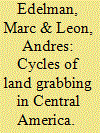

|
|
|
|
|
| Publication |
2013.
|
| Summary/Abstract |
The lack of historical perspective in many studies of land grabbing leads researchers to ignore or underestimate the extent to which pre-existing social relations shape rural spaces in which contemporary land deals occur. Bringing history back in to land grabbing research is essential for understanding antecedents, establishing baselines to measure impacts and restoring the agency of contending agrarian social classes. In Central America each of several cycles of land grabbing-liberal reforms, banana concessions and agrarian counter-reform-has profoundly shaped the period that succeeded it. In the Bajo Aguán region of Honduras-a centre of agrarian reform and then counter-reform-violent conflicts over land have been materially shaped by both peasant, landowner and state repertoires of contention and repression, as well as by peasants' memories of dispossession.
|
|
|
|
|
|
|
|
|
|
|
|
|
|
|
|
| 5 |
ID:
127944
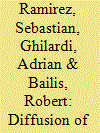

|
|
|
|
|
| Publication |
2014.
|
| Summary/Abstract |
ACM, Active Community Member, person that takes the initiative to fill out an application on behalf of a community; Seed, randomly selected ACM that allowed us to start collecting information; Ego, person that is interviewed. An Ego can also be an Alter, if it is mentioned by another Ego; Alter, people that provided (Type 1) or received (Type 2) information, as recalled by the Ego; Type 1 edge, an information flow in which an Alter provides information to an Ego; Type 2 edge, an information flow in which an Ego provides information to an Alter; Student, a person whose main occupation is to go to school; Radio, a message spread through the radio. Usually local stations in which an individual is interviewed; Internet, information about the stoves posted on Proyecto Mirador's Website; Maquila, a person that works at a factory for an international company, textile and food processing factories are usual; Agriculture, a peasant that works on agriculture, regardless of land tenancy; Health, a nurse, doctor or other health worker; Church, a priest, nun, minister or person who works as a minister of a faith; Education, a person who works as a school teacher or university professor; PM or PM associates, direct employees of Proyecto Mirador and its Implementers; Other NGO, a person that works on other non-governmental organizations. For example, Peace corps, Hivueras, Plan Honduras; Local, a local leader that has an appointment in the community but does not receive a monetary compensation. For example, members of the water board, village councils; Housewife, a woman whose main occupation is to keep the house; Business, a person that does commerce or services, includes people that sell food informally, artisans, masons, etc.; Government, a person who works directly for the government (except education and health practitioners); PM employees, direct employees without the implementers
|
|
|
|
|
|
|
|
|
|
|
|
|
|
|
|
| 6 |
ID:
110369
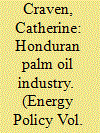

|
|
|
|
|
| Publication |
2011.
|
| Summary/Abstract |
Honduras is actively seeking ways to expand its palm oil industry for the purpose of processing biofuels for both internal consumption and export. This would be a critical juncture for Honduras, presenting an opportunity to move beyond the export of basic agricultural commodities and a history of path dependency and weak economic indicators. In order to glean lessons on how to approach palm oil expansion in the most effective manner, I turn to the Malaysian case. Once impoverished, Malaysia expanded plantations, promoted technological innovation, and provided financial incentives and tax structures to develop one of the most sophisticated palm oil industries in the world. In this paper, the insights to be gleaned from the Malaysian case are organized into three key themes: Governance, Investing in Research and Human Capital, and The Environment. Recommendations for Honduras include: increased collaboration with funding bodies, NGOs and universities to foster research; fiscal policies that support the development of a domestic market; and key environmental controls to ensure sustainability in the long term. These insights offer practical and pragmatic solutions not only for Honduras, but also the wider community of small, tropical, developing nations seeking to develop a viable biofuels sector.
|
|
|
|
|
|
|
|
|
|
|
|
|
|
|
|
| 7 |
ID:
109821


|
|
|
| 8 |
ID:
174552
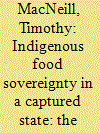

|
|
|
|
|
| Summary/Abstract |
This study explores the emergence of the Afro-Indigenous food sovereignty movement in the context of a captured Honduran state and unequal political economy. In contrast with national-level research that has advocated a policy of food security in the context of non-indigenous campesino movements, this work explains how food sovereignty is more appropriate regarding Garifuna Hondurans. In a political economy that has precluded other options, and given the deep cultural relation that Garifuna activists have to land and autonomy, food sovereignty provides a possibility around which Indigenous development can be animated. It encapsulates a local ‘fight’ response to repression as an alternative to northern ‘flight’, often via migrant caravans, that many Garifuna have undertaken. This study shows how food sovereignty, more than being a technical policy set, is a discursive and material node through which dispossessed and especially indigenous populations can enhance decolonial power in the contestation of entrenched hegemonic and institutionalised power in a corrupt, unequal and colonised political economy.
|
|
|
|
|
|
|
|
|
|
|
|
|
|
|
|
| 9 |
ID:
155524
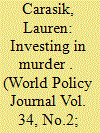

|
|
|
|
|
| Summary/Abstract |
Lawyer Lauren Carasik argues that the World Bank’s private-lending arm, the International Finance Corporation, has stoked a bloody land dispute in Honduras by funding the oligarch-owned agribusiness behind the violence. Now, with Carasik’s help, the Honduran farmers are taking the World Bank Group to U.S. federal court.
|
|
|
|
|
|
|
|
|
|
|
|
|
|
|
|
| 10 |
ID:
102164
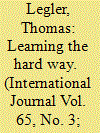

|
|
|
| 11 |
ID:
161548
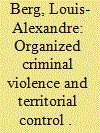

|
|
|
|
|
| Summary/Abstract |
What accounts for geographic variation in organized criminal violence? In Honduras, a country with one of the highest homicide rates in the world, the intensity of violence rivals many civil wars. Yet violent crime varies across cities and neighborhoods. Armed groups seeking to control territory use violence for different purposes, including competing against rivals, coercing residents and state officials, and exploiting the public for profit. Variations in community organization, defined as the density of interpersonal ties and the prevalence of shared expectations for collective action, affect the utility of violence for each of these purposes. Community organization can raise the cost of controlling territory, reduce the benefits of coercive violence, and generate pressure to protect residents from exploitation. These dynamics are examined through a comparison of nine neighborhoods in three of Honduras’s most violent cities, drawing from disaggregated homicide data and ethnographic research. The comparison shows that neighborhoods with denser community organization experienced lower levels of violence. Narrative evidence points to specific ways in which community organization mediates effects of competition among criminal groups and their interaction with state officials. Community characteristics thus affect the way non-state armed actors exercise authority in areas of limited state presence.
|
|
|
|
|
|
|
|
|
|
|
|
|
|
|
|
| 12 |
ID:
117966
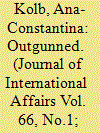

|
|
|
|
|
| Publication |
2012.
|
| Summary/Abstract |
Transnational organized crime (TOC) is an insidious and omnipresent element in twenty-first century Honduras, representing a clear threat to the stability of its democracy. Over the past five years, criminal organizations have extended their grip on the fragile states of the Northern Triangle-El Salvador, Guatemala, and Honduras-leading to a severe deterioration in citizen security. By leveraging domestic crime and violence, these organizations inhibit further development and prey on the glaring social inequality prevalent in these countries. This essay will use the definition of TOC as defined by the U.S. Strategy to Combat Transnational Organized Crime, which understands TOC as "those self-perpetuating associations of individuals who operate transnationally for the purpose of obtaining power, influence, monetary and/or commercial gains, or violence."1 The essay will mainly focus on transnational drug trafficking organizations (DTOs) actively operating in Honduras. First, the essay will give an overview of the operations and expansion of DTOs in the country. Subsequently, it will explore the effect of DTOs on Honduran governance and security. The essay will conclude with a review of current responses and recommendations for future policy.
|
|
|
|
|
|
|
|
|
|
|
|
|
|
|
|
| 13 |
ID:
118395
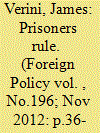

|
|
|
| 14 |
ID:
105851
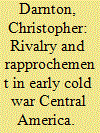

|
|
|
|
|
| Publication |
2011.
|
| Summary/Abstract |
Under what conditions does a common threat cause rival states to achieve rapprochement? To inform not only contemporary policy debates about coalition-building against terrorism and insurgency, but also theoretical debates about obstacles to cooperation and conflict resolution, this article examines the pattern of rivalry and rapprochement among Central American states-non-Communist allies under the Rio Treaty-in the shadow of the Cuban Revolution of 1959. Given a common threat, why did Honduras and Nicaragua shift from rivalry to rapprochement while Costa Rica and Nicaragua, and El Salvador and Honduras, did not? Drawing on rarely explored published primary sources in English and Spanish, the article argues that the major obstacle to cooperation was the parochial interest of the armed forces in perpetuating the old mission of international rivalry despite the attractive new mission of internal security, and that presidents were able to achieve rapprochement only where state resource constraints compelled a trade-off between the old and new missions. This argument is tested against realist alternatives including balancing and bandwagoning, and liberal alternatives including democratic peace and counterrevolutionary ideology. The article demonstrates that spoilers within the state can perpetuate international conflict, but also indicates conditions under which they can be convinced to support international cooperation.
|
|
|
|
|
|
|
|
|
|
|
|
|
|
|
|
| 15 |
ID:
111569
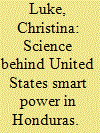

|
|
|
|
|
| Publication |
2012.
|
| Summary/Abstract |
The cultural heritage of Honduras offers a critical platform for United States heritage diplomacy under the United States Department of State, Bureau of Educational and Cultural Affairs, Cultural Heritage Center. Of specific note is the formal 2004 Honduran-American Memorandum of Understanding for the preservation of cultural property and, beginning in 2001, periodic projects under the Ambassadors Fund for Cultural Preservation. The diplomatic efficacy of American cultural heritage policy and the Ambassadors Fund comes from long-term, sustained funding from the National Science Foundation, the National Endowment for the Humanities, and the Fulbright Program. Established networks by archaeologists have enabled the successful re-entry of United States cultural diplomacy in Honduras in the last decade.
|
|
|
|
|
|
|
|
|
|
|
|
|
|
|
|
| 16 |
ID:
171101
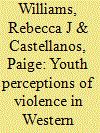

|
|
|
|
|
| Summary/Abstract |
Youth violence is a growing challenge worldwide, particularly in countries that are experiencing extreme social disorganisation. This is exemplified in Honduras which has been one of the top five countries in the world for intentional homicides for over 20 years. While many studies have examined youth violence in urban cities, few have researched youth violence in rural zones. This study presents a case study using social disorganisation theory to investigate the perceptions of 40 youth in rural and peri-urban Santa Rosa de Copán, Honduras, regarding what drives violence and the potential solutions. Consistent with social disorganisation theory, our results demonstrate that youth view violence as an opportunity pathway resulting from economic deprivation, disruptions to the family and neighbourhood, lack of or poorly functioning external agencies and conflicting moral values. There are significant gender differences in the results, with young men pointing to several issues that challenge masculine hegemonic gender norms such as the desire for love and belonging, participation in education and the role of policing.
|
|
|
|
|
|
|
|
|
|
|
|
|
|
|
|
|
|
|
|
|